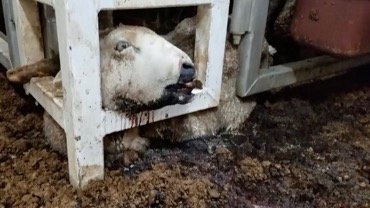Live Animal Export: Australian export licence permanently cancelled

Dr Lynn Simpson reports on a remarkable day as the livestock trades edge ever closer to oblivion.
After decades of failed regulation, Australia’s largest exporter of sheep has had its licence permanently cancelled by the Australian Department of Agriculture.
Today, it was announced that Emanuel Exports can no longer export live animals from Australia.
Years of lobbying, countless petitions, exposés of misconduct, multiple legal complaints and challenges have paid off.
Emanuel Exports (and its directors) have been responsible for shipping the majority of 200m sheep exported from Australia to the Middle East over the past 40 years. During those voyages more than 1.5m sheep have died on their vessels.
My old job as a shipboard veterinarian entailed that I euthanised many personally; it sucked.
Between the crew and myself, I can only guess the number we have collectively thrown to the sea. Only to watch their limp bodies bob aft in the water toward the wake of the ship, to be left to sink, unceremoniously, in the world’s oceans and seas.
Thanks to an amazing seafaring cadet, Fazal Ullah, his ethics, smarts and action; the world has seen seemingly unfathomable footage of the suffering and cruelty this trade inflicts upon innocent and vulnerable animals on these ships.
The Australian government has finally begun to listen to the voices, facts, science and the truth. And do its job!
As such it has begun being the meaningful regulator it should always have been. Had this happened earlier this trade would be a subject taught in history classes along with the once legal human slave trade. Better late than never.
Australian agriculture minister David Littleproud has now claimed his place in history and left a legacy for any other minister to meet.
This is a tremendous day for animal welfare, the justice system and Australian decency.
This is likely to be the beginning of a trend of decreased live animal exports from Australia, based on a trade regulator that is now regulating.
Globally, there is an expected mass reduction in live export ships on our waters from January 1 2020 when the IMO sulphur cap is applied, which will see another massive drop in numbers of live animals exported by sea.
With all that is happening globally on the political, social, business and legal levels, this trade is certainly on a major downturn and will soon be nothing but a nasty aftertaste.
For Lynn Simpson’s full archive of shocking exposés into the livestock trades, click here.

Great news!!!
Excellent news. Cattle next please.
Hello lynn, Your comments on the human slave trade caught my attention. The atlantic slave trade lasted for 340 years and over that time approx. 36000 people were traded annually. Today that number is approx. 600,000/800,000 annually. The point I’m making is where there is a buyer of a goods , theres a seller to fill the order.
Hi Lynn,
Great article and I much enjoy your frequent articles on this topic! I have also used a comparison with the slave trade and how the fact that many 18th century farmers had their businesses destroyed by the abolishment of the trade; however, this was outweighed by the fact that an industry with a business model based on suffering is ethically completely unacceptable.
I saw in your article from 29th May 2018 you had a comment from a farmer (Mr. David Griggs) about his opinion on how the farming rep bodies are selling our farmers short, and you also have spoken to (my hero) Mr. Fazal Ullah. How about writing an article where each paragraph represents opposition to live exports from different factors of society and including these two gentlemen? That would blow any argument of a “city/country” divide, or any other arguments that one particular group of people dominate the anti-live trade movement, out of the water.
Keep up the great work!